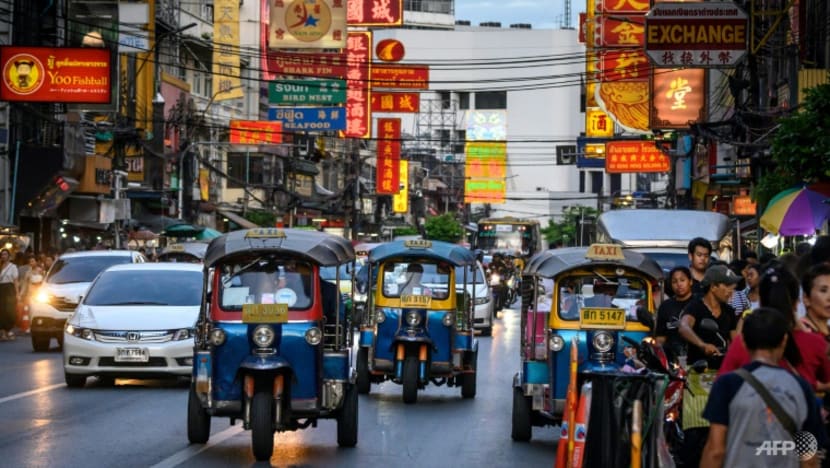‘Helicopter money’: Thailand’s 10,000-baht cash handouts facing criticisms from public, businesses and even elites
Thai Prime Minister Srettha Thavisin has defended the US$15 billion “digital wallet” scheme aimed at boosting domestic consumption, even as he acknowledged there are mixed feelings towards the policy.

Thailand's economy is recovering from the COVID-19 pandemic. Next year, its government plans to inject US$15 billion into the economy through a cash handout programme designed to boost domestic consumption. (Photo: AFP/File/Mladen Antonov)
BANGKOK: Mr Pradit Boonkate, 67, has been working in the Thai capital Bangkok as a security guard since he left his hometown in central Ratchaburi province some 16 years ago. He now earns 15,900 baht (US$437) monthly, with six days of leave annually.
His meagre pay explains why he was happy initially to hear that he would be among some 56 million Thais to receive a digital cash handout worth 10,000-baht from the new government next February under an economic incentive devised by the ruling Pheu Thai Party as part of its political campaign.
For low income-earners like Mr Pradit, the scheme, which involves the cash being disbursed digitally, may seem like a nice idea at first.
But when considering how the cash must be spent – in six months, on food, medicines and occupational tools at local businesses located within a 4km radius of their registered address – those who live and work far away from home could find it hard to enjoy the free money.
“For people who live in the countryside, there is a huge distance between the town and their homes. Their villages often have small grocery stores selling things like canned fish and eggs which won’t accept the digital money,” Mr Pradit, whose registered address remains in his Ratchaburi hometown, told CNA.
Although the government plans to adjust the conditions for remote areas to ensure the digital cash can penetrate and benefit all parts of the country, many people suspect the US$15 billion scheme will end up serving the rich and their big businesses, which already have the capacity to provide goods and the technology to accommodate transactions.
“How can small shops supply so many things?” Mr Pradit said. “It’s good to receive the money but if you ask who will enjoy the benefit, it’s the rich.”
THE GOVERNMENT GIVES, THE PEOPLE PAY?
The digital wallet programme is designed for Thai nationals, with only one qualifying condition: as long as they are aged 16 and above.
Its key objective is to increase the spending power of low-income earners while stimulating the economy through income distribution in communities nationwide.
But a group of reportedly 99 academics, economists and former governors of the Bank of Thailand have recently issued a joint statement against its implementation.
They urged the government to scrap the programme, arguing that such a massive expenditure to boost short-term consumption will run up public debt and hurt Thailand’s financial stability in the long run.
“Eventually, it's the people who will have to pay it back, whether it would be through higher taxes and/or higher prices of goods caused by inflation – a result of a monetary injection,” the statement said.
Last month, governor of the Bank of Thailand Dr Sethaput Suthiwartnarueput also advised that the policy should only target certain groups of people, as not everyone needs such financial aid and the economy is recovering well.
Also, some small business operators are hesitant to participate in the programme.
Ms Orapin Thanomsap, owner of a small food and goods store in Bangkok’s Watthana district, told CNA it is unclear how long she will have to wait before she can encash the digital payment from her customers.
Moreover, the 59-year-old doubts the scheme would generate more income for her shop as she believes most consumers are likely to spend the cash handouts at malls, convenience stores and big supermarkets.
“It’ll benefit 7-Eleven, not humble shops like mine, I can guarantee,” she said, adding she also plans to spend the digital money at big supermarkets to restock her shop while saving her own money.
“This will give a boost for the rich, for sure, as for the poor, they’ll just continue being poor.”
SPLIT AND DELAY THE DIGITAL PAYMENT
Prime Minister Srettha Thavisin on Saturday (Oct 14) defended his party’s policy even as he acknowledged there are mixed feelings towards the “digital wallet” scheme.
He claimed that by injecting US$15 billion into the economy through digital wallets, the scheme could increase public spending, boost productivity in the industrial sector and stimulate employment.
“Our intention is that the money is spent in local areas where your address is registered. This will help develop your communities and not just the big cities alone,” he wrote on social media platform X on Saturday.
But despite months of campaigning, Mr Srettha and his Pheu Thai Party have yet to determine how they will fund the multi-billion-dollar programme.
Related:
According to secretary-general to the prime minister Mr Prommin Lertsuridej, there are three possible sources for the money, including the 2024 fiscal year budget, borrowing from state agencies and other loans.
But political analysts say the national budget is out of the question as it will only be ready in April next year – two months after the proposed launch of the scheme.
“The budget plan will be submitted for royal approval on Apr 17, 2024… as a result, it can only be used afterwards,” said Assoc Prof Somchai Srisutthiyakorn, director of the Political and Development Research Centre at Rangsit University.
With the national budget out of the picture, he said the government will end up having to borrow money to implement the policy and that could lead to public criticism.
Instead, he suggested postponing the digital wallet programme to May next year – when the budget will already have become available.
Mr Somchai also proposed splitting the payment into two rounds, with the first 5,000-baht payment in May and the other half in November, in order to ease the country’s financial burdens.
“But this means they’ll lose face,” he said, referring to the Pheu Thai-led government.
A CAMPAIGN PROMISE AND POLITICAL FUTURE
The digital wallet programme was Pheu Thai’s big campaign promise, which analysts say cannot be broken if it hopes to win the next general election.
In May this year, the veteran political group lost an electoral race for the first time when it was beaten by the young and progressive party Move Forward.
Shortly after forming a coalition with the winner and opposition parties, Pheu Thai broke away from the Move Forward-led alliance to create a new one with the old ruling camp linked to the military and coup makers.
Its controversial manoeuvres have damaged Pheu Thai’s political image as a beacon of democracy in Thailand, resulting in what analysts describe as “a crisis of faith”.
“This (10,000-baht cash handout) policy is the policy they’ll use to win back the championship. If they succeed, it could make them a champion in the next election,” said Assoc Prof Dr Nantana Nantavaropas, dean of the Political Communication College, Krirk University.
Although Pheu Thai and its political predecessors are known for populist policies, these used to be in the form of providing financial support such as suspending debt repayments for farmers or subsidising healthcare costs, not just giving money freely to the public, she said.
“For the 10,000-baht digital wallet scheme, it’s really ‘helicopter money’, meaning money is just given out and it doesn’t have to be returned,” she told CNA.
With such a massive expenditure and little clarity on the implementation and how the money will be sourced, analysts warned that Pheu Thai could put Thailand in a risky situation by handing out free money to 56 million people.
According to Dr Nantana, while populist policies can help the poor, they should also be designed to promote self-improvement among the beneficiaries and ensure productivity in return.
Otherwise, she said, “it’s like fishing for the people without teaching them how to fish themselves”.
For low-income earners like Mr Pradit, 10,000 baht is a lot of money. But to spend it, he will have to take a day off and travel more than 100km to his hometown in Ratchaburi, where he hopes to find stores that would let him empty his digital wallet.
“I’ll buy something for my relatives there because I won’t be able to carry things back to Bangkok,” he said.
















